|
The Frontline Awards aim to recognise excellent practice, leadership and innovation in children’s social work across England. They celebrate the fantastic work that so many social workers are doing to support 700,000 children and their families each year. The awards also provide a platform to highlight and share the achievements of young people who have had the support of a social worker. For the 2023 awards there are six categories, four for individual social workers, one for young people with lived experience and one for a social work/ multi-disciplinary team. Winners will be revealed and celebrated at an event in London on 17 May 2023. Click link for a list of the shortlisted nominees: thefrontline.org.uk/frontline-awards/final-shortlist The Frontline Award for Young PeopleThe Fairer Fostering Partnership is proud to be a co-supporter of The Frontline Award for Young People. This award recognises a young person (aged 16-25) with first-hand experience of the social care system and will be awarded to them for their achievements, or to recognise that they have gone above and beyond to help create change within the sector.
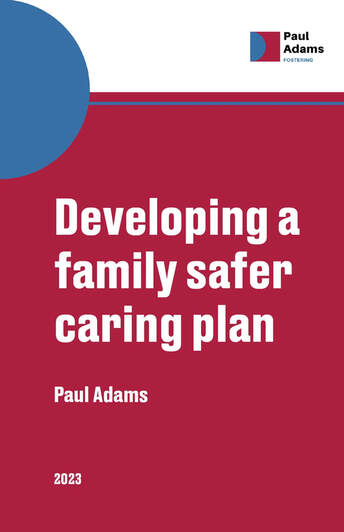 ‘Developing a Family Safer Caring Plan’ is an e-book authored by Paul Adams, designed to help social workers and foster carers complete and update high-quality family safer caring plans. The book emphasises the importance of creating plans that are individualised and ‘risk-sensible’, and contains a number of real-life practice examples. It comes with an accompanying template; Form FSCP. The book is available as a pdf document, which can be accessed on most personal computers and devices, and also as an e-pub document, that potentially offers a better reading experience on a number of tablets and e-readers. The accompanying Form FSCP is provided as a pdf document (with type-in boxes) and also as a word document. The Nationwide Association of Fostering Providers (NAFP) has purchased unlimited use of this e-book and the accompanying form for the use of their members, and these materials are available through the secure area of the NAFP website. The Fairer Fostering Partnership (FFP) has also purchased unlimited use of the materials for our members. The contact address for FFP members to access these materials is [email protected]. Local Authority Fostering Services and Independent Fostering Providers (who are not members of NAFP or FFP) are welcome to individually purchase the e-book and the accompanying form, for use within their organisation. For further information, please contact Paul Adams. The Fairer Fostering Partnership (FFP), a group of charitable and not-for-profit fostering agencies, is urging the government to increase financial support for foster carers during the cost-of-living crisis and warns of a potential disaster in the fostering sector if urgent action isn’t taken. In a letter (see below) to the Rt Hon Kit Malthouse MP, Secretary of State for Education, FFP calls for an immediate rise in fees and allowances for foster carers. It also suggests convening a round table of leading bodies and organisations in the care sector to look at ways of avoiding a catastrophic loss of foster carers during these challenging times. TACT CEO, Andy Elvin, writing in his role of FFP’s chair, said: "Local authority in-house fostering capacity is decreasing and this will accelerate as foster carers find they can no longer afford to foster. This will lead to cost increases of 300% - 400% for local authorities as they will be forced to use more residential care. ...Not only would a shortage of foster carers be wholly contrary to the best interests of children, but it would also be financially ruinous for local authorities". While lobbying for greater government aid, fostering charity TACT and other independent fostering agencies have already increased their own fees and allowances for foster carers to counter the cost-of-living crisis. Andy Elvin said: ”The Covid-19 crisis demonstrated that fostering is pandemic-proof and with the right support in place it is also recession-proof. So it is actually an excellent choice of vocation in these difficult times. Fostering is not only a great option in the current economic climate thanks to financial support by fostering charities like TACT, but it is also hugely rewarding on a personal level, helping vulnerable children and young people, and there is great demand for carers across the UK.” Dear Secretary of State,
Firstly, congratulations on your new role and welcome to the Department of Education. I am writing to you on behalf of The Fairer Fostering Partnership. We are an umbrella organisation of charitable and not-for-profit fostering agencies across the UK. With our charity and non-profit status, all of the income we receive for providing foster care is reinvested directly into our services for children and support for foster carers. I would like to draw your urgent attention to the potential crisis facing capacity within the care system owing to the cost-of-living crisis. The Competition and Markets Authority found serious deficiencies in the children’s social care ‘market’, one of which is the lack of a mechanism for fostering providers to receive inflationary increases in fees. In essence this means that we are financially penalised for doing what is best for children, providing long term care, as the fee we agree on at the outset must remain until the child moves on. When inflation was low this was problematic but manageable, it is now, potentially, catastrophic. Urgent action needs to be taken so that we can raise foster carers’ fees and allowances. Local authority in-house fostering capacity is decreasing and this will accelerate as foster carers find they can no longer afford to foster. This will lead to cost increases of 300%- 400% for local authorities as they will be forced to use more residential care. Local authorities report that they have no funding available to address this issue and we are therefore urging you to take immediate steps to support foster carers financially. In addition to straightforwardly providing more funding specifically for foster carers, other approaches could include: Encouraging all local authorities to exempt all foster carers from council tax. Ask HM Treasury to raise the tax threshold for foster carers, as since it not been increased since its introduction in 2003. We would also like to propose that you convene an urgent roundtable that might include ourselves, the Local Government Association, the Association of Directors of Children’s Services and the Independent Review team to look at how we might together address this issue and prevent significant attrition of foster carers. Not only would a shortage of foster carers be wholly contrary to the best interests of children, but it would also be financially ruinous for local authorities. Thank you for your consideration of this issue and I look forward to your response. Andy Elvin TACT CEO & Chair of The Fairer Fostering Partnership The Fairer Fostering Partnership believes that we need to build relationships in any system that we envision for children who cannot live with their birth parents. The current social care system does not support this and, in some cases, even discourages it.
Clear examples of this are when foster carers are not given full delegated authority for the children and young people they are looking after, or they do not receive appropriate financial support to do so. We believe that children, young people and care experienced adults need to be consulted and listened to and given the power to co-design, co-create, and co-produce the services they are entitled to. We also believe that as a sector there is much expertise that is not being tapped or even considered by Government which could drive innovative change. To this end we have submitted our ideas to the Independent Review of Children’s Social Care (IRCSC). Read our full 'Vision for Children in Foster Care' submission. NB The Fairer Fostering Partnership submitted each idea separately to the IRCSC via the online call for ideas portal. 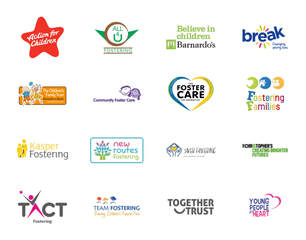 The Fairer Fostering Partnership (FFP) is a group of charitable and not-for-profit fostering agencies across the UK whose members look after more than 2,000 children in care. We are seeking to promote understanding of the difference between our members, and the commercial fostering agencies owned by private and venture capital companies that make significant profits for shareholders. To that end, our members will be using this hashtag - #forchildrennotprofit - on all our social media platforms to support that message. FFP members work purely for children, not for profit, and in a financially strapped sector funded by taxpayers helping thousands of vulnerable children in care, it is important that local authorities and foster carers are able to make an informed choice as to which fostering providers they work with. Andy Elvin, the FFP Chair, said: “All our members’ resources are invested in meeting the needs of vulnerable children and young people, and not in making a profit from them. This transparency and accountability is welcomed by local authorities and foster carers alike, but we need to continue promoting the message that excessive profits are being made by some agencies at a time when there is less money in the system. That clearly can’t be a good thing for children in care.” FFP membership covers the whole of the UK, and includes TACT, Action for Children and Barnardo’s (to name a few), providing foster care for thousands of children. Working in partnership with children’s services and dedicated foster carers, FFP members put children before profit by re-investing any surplus back into the care of children and young people. FFP endeavours to increase Local Authorities and Trusts’ understanding of the difference between investing in children or adding to shareholder profit. Each FFP member has its own unique and distinctive approach to fostering. All offer a variety of trained, well supported, and experienced carers and staff, plus a service package tailored to the best possible outcomes for each individual child or young person. The Fairer Fostering Partnership believes that where a surplus is made, it should be re-invested into children’s services; and that excessive profit has no place in the care of vulnerable children. We are confident that the current DfE commissioned Independent Review of Children’s Social Care will address this issue and this issue has been flagged up by the Care Review and in the Promise in Scotland which has been accepted by the Scottish Government. ENDS Information for Editors The Fairer Fostering Partnership (formerly Fostering through Social Enterprise) was set up in 2007 to represent the views, perspectives and experience of a number of charitable and not for profit independent fostering providers. The current Fairer Fostering Partnership members are:
Our core aims are:
Fostering through Social Enterprise (FtSE), a group of 12 charitable and not-for-profit independent fostering providers, has changed its name to The Fairer Fostering Partnership (also known as Fairer Fostering).
The group, which covers the whole of the UK, and includes Action for Children, Barnardos and TACT, provides foster care for over 2000 children. Working in partnership with children’s services and dedicated foster carers, Fairer Fostering members put children before profit by re-investing back into the care of children and young people. Andy Elvin, the Fairer Fostering chair, said: “All our members’ resources are invested in meeting the needs of vulnerable children and young people and not in making a profit from them. This transparency and accountability is welcomed by local authorities and foster carers alike. We wanted our name to reflect this.” As a representative voice of not-for-profit providers, Fairer Fostering campaigns to increase awareness of the scale of profits distributed to shareholders and investors. Many commercial fostering agencies are owned by private and venture capital companies and significant profits are made by these companies. Fairer Fostering asks commissioners to understand who they award contracts to and where taxpayers’ money goes. It could be the difference between investing in children or adding to shareholder profit. Each Fairer Fostering member has its own unique and distinctive approach to fostering. All offer a variety of able, experienced and trained carers, and staff, plus a service package tailored to the best possible outcomes for each individual child or young person. Members’ services augment those of hard-pressed health and local authority provision. The Fairer Fostering Partnership believes that where a surplus is made, it should be re-invested into children’s services; and that excessive shareholder profit has no place in the care of vulnerable children. ENDS Contact details Andy Elvin, TACT - Chair of Fairer Fostering Tel No. 0208 695 8142 | Email [email protected] Ian Brazier, The Foster Care Co-operative - Deputy Chair of Fairer Fostering Tel No. 01684 892380 | Email [email protected] Information for Editors The Fostering through Social Enterprise consortium, now The Fairer Fostering Partnership, was set up in 2007 to represent the views, perspectives and experience of a number of charitable and not-for-profit independent fostering providers. The current Fairer Fostering members are:
Fairer Fostering’s core aims are:
Fairer Fostering members:
|
News & JobsNews stories and job vacancies from our member agencies, the fostering sector and the world of child protection and safeguarding as a whole. Browse Categories
All
|
|
The Fairer Fostering Partnership
c/o TACT Fostering Innovation House PO Box 137 Blyth NE24 9FJ |


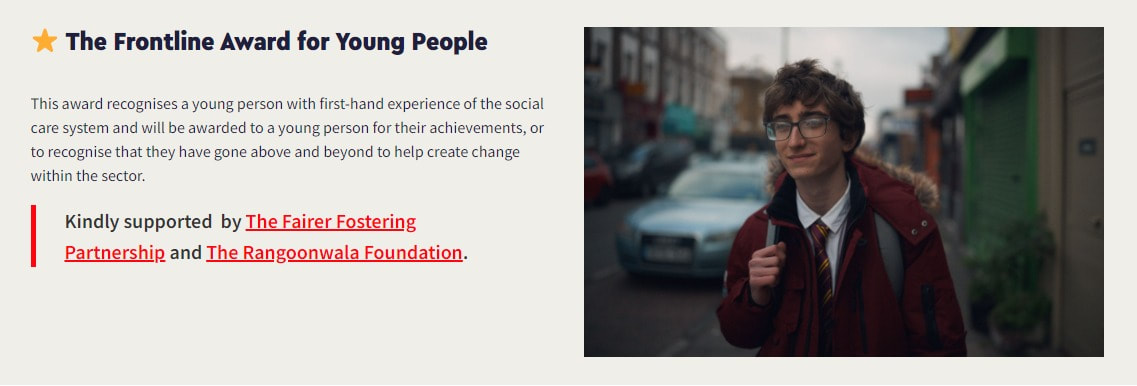
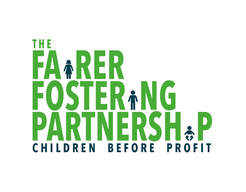
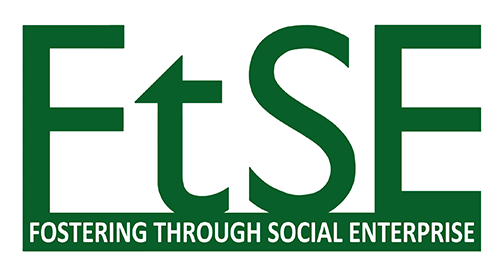
 RSS Feed
RSS Feed
